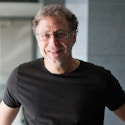On 1 February 2017, Arnold Kriegstein described recent advances in our understanding of the unique features of human cortical development and discussed insights into the origins of neurodevelopmental disorders.
His talk was part of the Simons Foundation Life Sciences lecture series.
About the Lecture
The developing human cortex contains a massively expanded outer subventricular zone, not found in rodents, that contains neural progenitor cells responsible for an evolutionary increase in cortical size and complexity. Transcriptome profiling of these cells has provided a novel model of primate corticogenesis and provided insights into lissencephaly (smooth brain syndrome) and microcephaly (smaller than normal brain size).
In this lecture, Arnold Kriegstein described recent advances in our understanding of the unique features of human cortical development. He also highlighted an evolutionary increase in the number of a specific subtype of neural stem cell, oRG cells, which in concert with their transit amplifying daughter cells, contributed to increased cortical size and complexity of the human brain. In addition, he discussed how mRNA sequencing of single human progenitor cells and immature cortical neurons led to a novel model of human cortical development and provided insights into the origins of neurodevelopmental disease.




